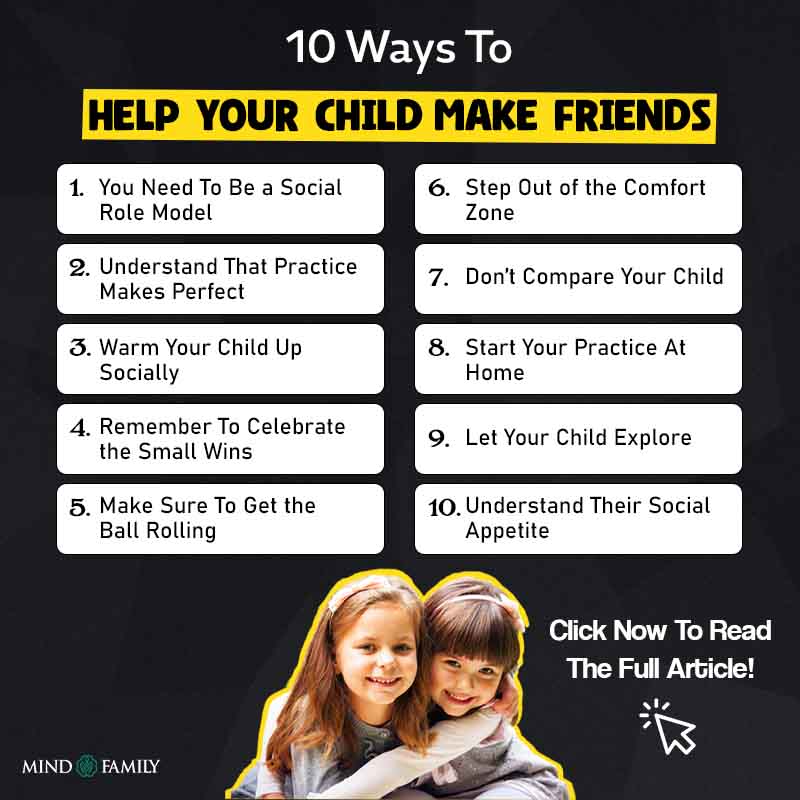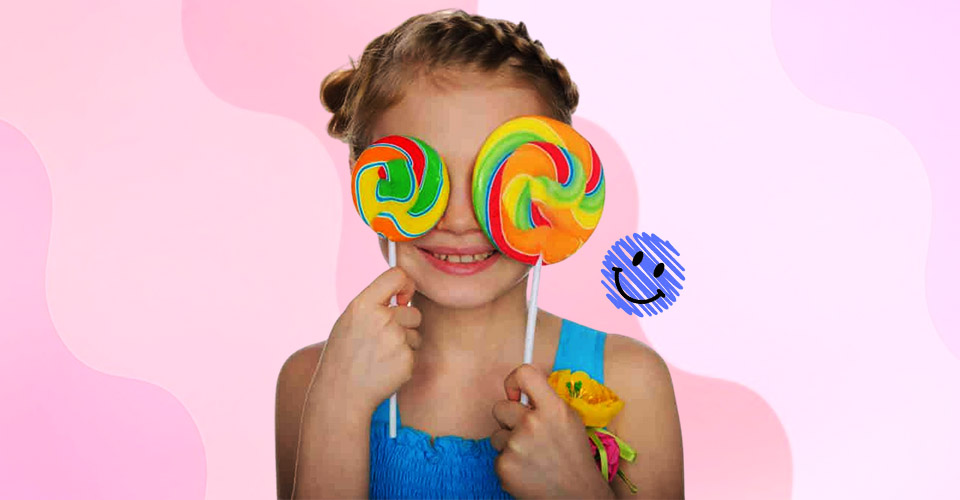Are you helping your child make friends but finding it harder than you thought? Don’t worry! We have some effective tips for you to learn how to help your child make friends!
Building relationships and making friends are some of the hardest things in a child’s life. They look to us to be their guiding light and that is why I applaud your effort of looking at how you can help.
We are here to help to turn your child’s life around faster than you can say well, whatever ridiculously fast thing you can think of! So hold onto your “Best Parent” mugs, because we’re here to help you become the best ‘wingman’ for your child!
But first, you need to understand the importance of having childhood friendships.
Importance Of Having Childhood Friendships

Remember the days when your biggest worry was whether you’d get picked first for kickball or have enough snacks for your after-school playdates? Ah, childhood— time of carefree adventures, scraped knees, and, most importantly, lifelong friendships.
While we often reminisce about those innocent times with a nostalgic grin, it turns out that childhood friendships aren’t just a fond memory—they’re a critical ingredient in the recipe for a happy, healthy life.
Understanding how to help your child make friends requires learning about the positive impacts of childhood friendships. Let’s take a look at some of the benefits below:
1. Friends Provide An Emotional Safety Net
From sobbing over a scraped knee to plotting revenge against the neighborhood bully, childhood friends are the ride-or-die confidants our children can have.
Remember our childhood when our friends were the ones who wiped away our tears with their sleeves (gross, but appreciated), and reminded us that we were tougher than a soggy PB&J sandwich.
Little did we know, these moments of shared trauma were building the foundation for our future therapy sessions—er, I mean, emotional resilience. Give your child the chance to create those therapy-requiring experiences.
Read More: Surviving Toxic Friendships: 15 Shocking Signs Of An Abusive Friend
2. They Will Your Child In Their Identity
Forget finding yourself on a mountaintop—childhood friendships are like a comedy club where your child could try out as many personas as they have dress-up costumes.
From playing doctor to experimenting with their “rockstar” phase (complete with air guitar solos), your kid’s childhood friends are their loyal audience. It does not matter whether they like it or not.
Learning how to help your child make friends will enable your child to go through adventures and will help them build their character and relationships.
3. Lifelong Source of Laughter
Childhood’s all about those laugh-till-you-snort moments. Friends are the ones who find it hilarious when your kid tells a joke that makes zero sense or sports a hairstyle that defies gravity. It’s like having your live comedy show, minus the two-drink minimum.
As you help your little buddies navigate the exciting journey of friendship, remember: it’s not just about sharing directions. It’s about going on a big adventure together, with a telescope in one hand and lots of laughs in the other.
Read More: How to Teach Your Child to Tell Time: A Step-by-Step Guide For Parents!
How to Help Your Child Make Friends: 10 Effective Tips!
Learning how to help your child make friends is a vital part of parenting, blending the art of gentle encouragement with the science of understanding social dynamics.
Here are 10 expert-backed tips you can use as parents to help your child make friends:
1. You Need To Be a Social Role Model
The most effective way how to help your child make friends is to be their role model. Children imitate what they see more than what they’re told. If they see you engaging positively with others, they’re likely to mimic that behavior.
Dr. Eastman emphasizes the importance of modeling positive social behavior, as children learn by example from every interaction they have. So, the next time you’re chatting with the cashier or waving to the neighbor, remember, you’ve got a tiny audience taking notes.
2. Understand That Practice Makes Perfect
Role-playing at home can turn your living room into a social skills gym. Practice scenarios ranging from sharing toys to asking someone to play, which can boost your child’s confidence.
This method is particularly helpful for children who may need more structured guidance, like those on the autism spectrum, as they can benefit from rehearsing social scripts. Think of it as dress rehearsals for the big show: the playground.
3. Warm Your Child Up Socially
Helping your child get comfortable with a new activity before diving in can ease their anxiety. It’s like doing stretches before the big race. If they’re nervous about joining a sports team, for instance, playing catch beforehand can make the actual practice less daunting. This strategy of acclimation can help build up their confidence, making the transition smoother.
4. Remember To Celebrate the Small Wins
Positive reinforcement goes a long way. Acknowledging even the smallest social successes can encourage your child to keep trying. Constant motivation is crucial when learning how to help your child make friends.
Dr. Howard from the Child Mind Institute suggests that kids are more motivated by praise than by avoiding criticism.
Specific, labeled praise like “You shared your toys so well today!” can be more effective than a generic “Good job”. It’s like cheering for the little victories that lead to winning the friendship game.
5. Make Sure To Get the Ball Rolling
For younger kids, a one-on-one playdate can set the stage for friendship, while older kids might enjoy a group activity like a pizza party. The goal is to make socializing a positive experience, as noted by Dr. Eastman.
Think of it as hosting the social event of the season, where the main attraction is fun and friendship.
6. Remember To Step Out of the Comfort Zone
Gently encouraging your child to engage in social situations can help them develop their social skills. It’s about finding the balance between supporting them and pushing them to grow.
Dr. Eastman advises not to avoid social situations, as overcoming these challenges is part of learning. Consider it a nudge towards the deep end of the social pool, with you as their lifeguard.
Read More: How To Heal Mother-Daughter Relationships: 10 Essential Ways To Mend Your Bond!
7. Don’t Compare Your Child
Every child is unique, and their social needs and preferences will vary. Comparing your child to others, or even to yourself, can set unrealistic expectations.
Experts remind parents to be realistic about their child’s temperament and to embrace their individuality. It’s about celebrating their unique social style, whether they’re the life of the party or prefer a quiet book club.
8. Start Your Practice At Home
Starting with playdates at home can help shy kids feel more at ease. It’s their familiar territory, where they can navigate social waters with more confidence.
Dr. Busman suggests using clubs or structured activities as another way to foster friendships, as they provide a built-in structure that minimizes anxiety. Think of your home as the training ground for future social champions.
9. Let Your Child Explore
Encouraging your child to join clubs or activities that align with their interests can help them connect with like-minded peers. It’s about finding their tribe, where shared passions pave the way for deeper connections.
This shared interest provides a natural topic for conversation, making social interactions flow more easily.
10. Understand Their Social Appetite
Recognizing and respecting your child’s social preferences is key. Not every child dreams of a wide social circle, and that’s okay. Dr. Busman highlights the importance of distinguishing between shy children and those who are simply more introverted.
Learning about how to help your child make friends is ensuring they have opportunities to make friends, without pushing them beyond their comfort zone.
By incorporating these strategies into your parenting approach, you can help your child navigate the complexities of making friends, ensuring they have the support and guidance they need to build meaningful relationships.
Remember, the goal isn’t to mold them into the most popular kid in class but to help them find genuine connections that enrich their lives.
Read More: How to Raise a Child with Autism: 5 Vital Tips and Examples!
A Word From Mind Family
Parenting is a bit like being a social architect, designing and supporting the structures that will help your child build lasting friendships. Remember, being a good friend starts with seeing how you chat and hang out with others. Your little one is watching and learning from you, so show them how it’s done.
Sometimes, stepping out into the big, wide world can be scary, but with a little nudge from you, your child can learn to dive into new friendships, just like dipping their toes into the pool before the big splash.
It’s all about what makes them happy.
You’ve got this! With these tips, you’re all set to help your child find their crew, one smile, and high-five at a time.
Frequently Asked Questions (FAQs)
1. Why are childhood friendships important?
Childhood friendships are vital for emotional support, identity formation, and social skill development, laying the groundwork for healthy relationships in adulthood.
2. What are childhood friendships?
Childhood friendships are bonds formed between children, providing companionship, emotional support, and shared experiences that contribute to their development and well-being.
3. How to help your child make friends?
Parents can help their children make friends by being positive social role models, encouraging practice, celebrating small successes, and providing opportunities for socialization through playdates and activities aligned with their interests.














Leave a Reply